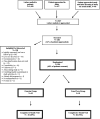Effect of the LIVESTRONG at the YMCA exercise program on physical activity, fitness, quality of life, and fatigue in cancer survivors
- PMID: 27893938
- PMCID: PMC5360506
- DOI: 10.1002/cncr.30456
Effect of the LIVESTRONG at the YMCA exercise program on physical activity, fitness, quality of life, and fatigue in cancer survivors
Abstract
Background: Physical activity (PA) has been linked to a lower risk of developing and dying of cancer, yet many cancer survivors do not exercise. In the current study, the authors evaluated the impact of the LIVESTRONG at the YMCA exercise program, available at Young Men's Christian Associations (YMCAs) across the United States, on PA, fitness, quality of life, fatigue, body composition, serum biomarkers, and program safety in cancer survivors.
Methods: Cancer survivors were recruited through the Yale Cancer Center and the Dana-Farber Cancer Institute and randomized to a 12-week, twice-weekly LIVESTRONG at the YMCA exercise program at YMCAs in Connecticut or Massachusetts or to a control group. Questionnaires, dual-energy x-ray absorptiometry scans, 6-minute walk tests (6MWTs), and a fasting blood draw were completed at baseline and at 12 weeks. Intervention effects were evaluated using mixed model repeated measures analysis, with changes at 12 weeks in PA and 6MWT as the primary endpoints.
Results: A total of 186 participants were randomized (95 to the exercise group and 91 to the control group). The majority of patients were diagnosed with AJCC stage I to II cancer and 53% had breast cancer. Participants randomized to the LIVESTRONG at the YMCA program experienced increases in PA (71% exercising at ≥ 150 minutes/week vs 26% of controls; P<.05) and improvements in the 6MWT (group difference: 28.9 meters [95% confidence interval, 0.3-49.0; P = .004]) and quality of life (group difference: 2.6 [95% confidence interval, 0.1-5.0; P = .04]). No adverse events were reported.
Conclusions: The LIVESTRONG at the YMCA exercise program has the potential to impact thousands of survivors across the YMCA network and could lead to improvements in disease and psychosocial outcomes in the growing population of cancer survivors. Cancer 2017;123:1249-1258. © 2016 American Cancer Society.
Keywords: cancer; fatigue; obesity; physical activity; quality of life.
© 2016 American Cancer Society.
Conflict of interest statement
Figures



References
-
- McTiernan A, Kooperberg C, White E, et al. Recreational physical activity and the risk of breast cancer in postmenopausal women: the Women’s Health Initiative Cohort Study. JAMA. 2003 Sep 10;290(10):1331–6. - PubMed
-
- Holmes MD, Chen WY, Feskanich D, et al. Physical activity and survival after breast cancer diagnosis. JAMA: the journal of the American Medical Association. 2005 May 25;293(20):2479–86. Epub 2005/05/26. eng. - PubMed
-
- Rock CL, Doyle C, Demark-Wahnefried W, et al. Nutrition and physical activity guidelines for cancer survivors. CA Cancer J Clin. 2012 Jul-Aug;62(4):243–74. Epub 2012/04/28. eng. - PubMed
Publication types
MeSH terms
Substances
Grants and funding
LinkOut - more resources
Full Text Sources
Other Literature Sources
Medical
Miscellaneous

